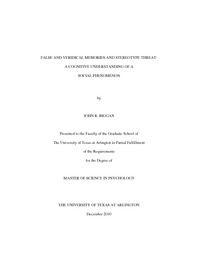
ATTENTION: The works hosted here are being migrated to a new repository that will consolidate resources, improve discoverability, and better show UTA's research impact on the global community. We will update authors as the migration progresses. Please see MavMatrix for more information.
Show simple item record
| dc.contributor.author | Biggan, John R. | en_US |
| dc.date.accessioned | 2011-03-03T21:53:34Z | |
| dc.date.available | 2011-03-03T21:53:34Z | |
| dc.date.issued | 2011-03-03 | |
| dc.date.submitted | January 2010 | en_US |
| dc.identifier.other | DISS-10852 | en_US |
| dc.identifier.uri | http://hdl.handle.net/10106/5539 | |
| dc.description.abstract | In 1995, Steele and Aronson found that when asked to simply indicate their race prior to a memory test (Study 4) black participants performed significantly worse on a memory test than when not asked to indicate their race. However, their white counterparts did not show a decrease in performance. This effect is often referred to as stereotype threat. The effect has been replicated using various tests of general memory and even sporting performance (Beilock & McConnell, 2004). In the cognitive literature memory processes are often broken down into two processes, referred to as recollection and familiarity. Recollection is best understood as an exact replica of the original memory, whereas familiarity is a more generalized memory. These processes can are generally thought to be associated with veridical and false memories. Additionally, memory impairments can lead to lower veridical remembering and increased false remembering (McCabe, Roediger, McDaniel, & Balota, 2009). There is some evidence to suggest that stereotype threat may be affecting these processes independently which may lead to differences in false memory formation. However, there has been no direct test of this in the extant literature. Therefore, a well-replicated paradigm that is often used in the cognitive literature to better understand false memory formation was used. The Deese-Roediger-McDermott paradigm, a set of semantically associated word lists, is an excellent paradigm to test the possibility that stereotype threat may be affecting veridical and false memories differently (Deese, 1959; Roediger & McDermott, 1995). Although veridical memory was strongly affected by stereotype threat, false memory showed no significant effect of the manipulation. | en_US |
| dc.description.sponsorship | Baum, Andrew | en_US |
| dc.language.iso | en | en_US |
| dc.publisher | Psychology | en_US |
| dc.title | False And Veridical Memories And Stereotype Threat: A Cognitive Understanding Of A Social Phenomenon | en_US |
| dc.type | M.S. | en_US |
| dc.contributor.committeeChair | Baum, Andrew | en_US |
| dc.degree.department | Psychology | en_US |
| dc.degree.discipline | Psychology | en_US |
| dc.degree.grantor | University of Texas at Arlington | en_US |
| dc.degree.level | masters | en_US |
| dc.degree.name | M.S. | en_US |
Files in this item
- Name:
- Biggan_uta_2502M_10852.pdf
- Size:
- 638.7Kb
- Format:
- PDF
This item appears in the following Collection(s)
Show simple item record


